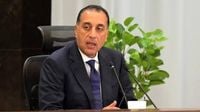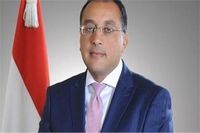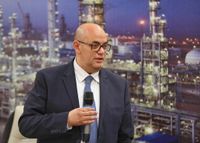In a significant effort to enhance communication and cooperation with the petroleum media, Engineer Moataz Atallah, the official spokesperson for the Ministry of Petroleum and Mineral Resources, recently held an extensive meeting with journalists covering petroleum and mining sectors. This meeting took place at the ministry's headquarters in the administrative capital and was attended by a dedicated team from the ministry's media department.
The primary goal of this gathering was to strengthen the bonds of cooperation and appreciation for the vital role played by the petroleum media in accurately portraying the sector's efforts across various production sites. Atallah emphasized that the media serves as a key partner in the petroleum sector's endeavors and its ongoing developments. He noted the crucial role journalists play in disseminating accurate, up-to-date information to the public regarding the sector's contributions to the national economy and citizens.
"The media is a key partner in the efforts of the petroleum sector and following up on its developments," Atallah stated during the meeting. He underscored the importance of journalists in conveying the sector's role and the efforts of its personnel throughout the complete value chain of the petroleum industry—from exploration and production to refining and distribution.
During the meeting, Atallah also addressed several pressing issues and updates within the petroleum and mining sectors. He responded to inquiries from journalists, clarifying information regarding preparations for the summer season and outlining the ministry's comprehensive executive plan in coordination with relevant ministries to ensure stability in electricity supply and the regular flow of natural gas supplies.
Additionally, Atallah highlighted the ministry's ongoing efforts to promote investment opportunities in exploration and production, as well as the steps being taken to stimulate investment in the mining sector. He expressed optimism about upcoming positive changes in the mining industry, driven by enhanced efficiency and increased attractiveness for investors.
Moreover, Atallah pointed out the ministry's successful initiative of engaging young talents as assistants to leaders and in leadership roles, aimed at preparing a new generation capable of taking on future responsibilities. "We are committed to maximizing the benefits derived from mineral resources," he remarked.
Journalists from the petroleum and mining sectors expressed their appreciation for this initiative, which reflects the ministry's dedication to maintaining direct communication and transparency. They praised the open dialogue atmosphere that characterized the meeting, affirming their professional commitment to accurately covering the sector's efforts and conveying them to the public.
In a separate but related development, Dr. Mostafa Madbouly, Chairman of the Council of Ministers, addressed concerns regarding three companies that have recently withdrawn from exploration and drilling activities in certain areas. He clarified that this does not signify a complete exit from the Egyptian market. "What happened with the 'Zohr' field is a good indication; one company previously announced the absence of discoveries in the region, only for 'Eni' to later find the largest oil field in Egypt's history," he explained during a press conference.
Madbouly also announced a significant influx of investments from Saudi Arabia and Qatar into Egypt. He noted that a large delegation of Saudi businessmen, comprising 300 senior figures, recently visited Egypt, signaling a forthcoming increase in Saudi investments.
Furthermore, he revealed ongoing collaborations with Qatari officials to inject $7.5 billion in investments into Egypt, a move stemming from President Abdel Fattah El-Sisi's recent official visits to Qatar and Kuwait. "There was an announcement about a package of promising investments that Qatar intends to inject into Egypt, totaling $7.5 billion," he stated, expressing optimism about the strong interest from Kuwait in enhancing its investments in Egypt.
Madbouly emphasized the importance of strengthening bilateral relations with both countries, highlighting that the economic agenda was a priority during these discussions. He confirmed that there was a complete agreement on various issues facing the Arab nation, particularly regarding the Palestinian cause, illustrating the commitment to fostering collaborative relationships.
As the ministry continues to engage with the media and stakeholders, it remains focused on transparency and the importance of clear communication. The recent meetings signify a proactive approach to ensure that the public remains well-informed about the developments within the petroleum and mining sectors. The ministry's dedication to fostering a cooperative relationship with journalists will likely enhance the sector's image and facilitate better understanding among the public.
In conclusion, the Ministry of Petroleum and Mineral Resources is poised for a transformative period, with initiatives aimed at bolstering investment and improving communication with the media. As the sector navigates challenges and opportunities, the ongoing dialogue with journalists will play a crucial role in shaping public perception and fostering trust in the petroleum industry.






